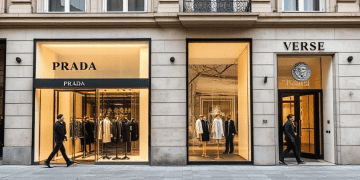Prada Group has announced an agreement to acquire Versace from Capri Holdings for €1.25 billion. The transaction, which will provide Prada Group with full ownership of the Italian luxury fashion brand, is still subject to regulatory approval.
The announcement comes amid a period of market uncertainty influenced by global economic conditions, including the potential impacts of U.S. tariffs on luxury goods. Experts have expressed concerns that such economic factors could affect the recovery of the luxury goods market, which had shown signs of growth in late 2024 and early 2025.
Prada’s interest in acquiring Versace was first reported in January, with sources revealing that Capri Holdings had been exploring the sale of Versace and had reached out to potential buyers. Following a failed merger attempt between Capri Holdings and Tapestry in 2023, the company had indicated the possibility of selling individual brands, including Versace.
To fund the acquisition, Prada Group will issue €1.5 billion in debt. Both Prada and Capri Holdings’ boards of directors have approved the terms of the deal, which, if cleared by regulators, is expected to close in the second half of 2025.
The acquisition is seen as a strategic move by Prada to bolster its position in the competitive luxury market, where it will compete with global giants like LVMH and Kering SA. For Versace, the deal presents an opportunity for revitalization and growth under Prada’s leadership.
The deal occurs against the backdrop of heightened market volatility, partly due to the U.S. tariff policy under former President Donald Trump. The U.S. remains a key market for European luxury goods, including brands like Versace. According to Bernstein investment bank, European luxury brands rely on the U.S. market for 15% to 30% of their total sales.
The U.S. recently imposed a 20% import duty on certain European goods, which could affect pricing and consumer demand for luxury brands in the U.S. While experts suggest that potential tariff exceptions or delays may mitigate the direct impact, the broader economic uncertainty is expected to dampen consumer confidence and market conditions.
The global luxury goods market experienced a slight decline in 2024, with sales dropping by 1% to €1.48 trillion, after a period of rapid growth post-pandemic. Despite this, the long-term outlook remains positive, with analysts forecasting a 4% growth rate for the personal luxury goods segment in 2025 and an average annual growth of 4-6% through 2030.
Stay informed with supply chain news on The Supply Chain Report. Free tools for international trade are at ADAMftd.com.
#PradaAcquisition #VersaceDeal #LuxuryFashionMarket #FashionIndustryNews #MergersAndAcquisitions #EuropeanLuxuryBrands #GlobalFashionBusiness













